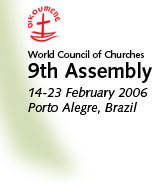|
Latin America plenary.
Sunday, 19 February 2006
Prepared by the Latin Americal Council of Churches (CLAI) and the Brazilian churches with the WCC, this plenary shared the history, culture and spirituality of Latin America with Assembly participants, reflecting on critical moments in the region's history (economic crises, military regimes) and the churches' responses to these challenges. The purpose was to convey the complex and dynamic reality of Latin America's churches and their contributions to the ecumenical movement as well as to identify future challenges.
See: Plenary presentations: Latin America
Assembly plenary sessions on crucial contemporary issues were designed to present these issues in a manner that would highlight their importance and relevance for the churches and the ecumenical movement. There was also an orientation plenary, one that attempts to present in a concise and attractive form the main activities and developments in WCC since the 8th assembly ("From Harare to Porto Alegre"), and a number of "business" and decision-making plenaries.
Themes to be examined in plenary at the 9th Assembly were:
Economic justice - A world without poverty is possible! Thursday, 16 February 2006
After briefly reviewing economic injustice from biblical/ethical as well as social/economic perspectives, the plenary shared highlights on a variety of church alternatives to the present economic system, and on the AGAPE (Alternative Globalization Addressing People and Earth) process - a series of church consultations and studies initiated by the WCC's Justice, Peace & Creation team after the 1998 Assembly.
See: Alternative Globalization Addressing People and Earth - AGAPE: a call to love and action
Christian identity and religious plurality.
Friday, 17 February 2006
The purpose of this plenary was to renew ecumenical reflection among churches on religious plurality and its implications, theological and otherwise. It also aimed at enhancing dialogue on perceptions and on the significance of Christian identity in different cultures and contexts, as well as on the connection between self-understanding and witness in diverse situations of religious plurality.
See: Religious plurality and Christian self-understanding
Youth overcoming violence.
Saturday, 18 February 2006
This plenary highlighted the spirit and energy unleashed by the WCC Decade to Overcome Violence 2001-2010 (DOV) and offered testimonies on local, national and regional DOV initiatives in various regions. It attempted to identify challenges for the second half of the Decade, and invited the DOV community to recommit to the vision and call of the Decade.
See:
Church unity - Claiming a common future.
Monday, 20 February 2006
This plenary was designed to affirm that the church's quest for unity is the indispensable response to the unity already given in Christ, and to Christ's claim upon us and our lives. A panel of Orthodox, Roman Catholic and Protestant participants explored the "Statement on ecclesiology" drafted for this Assembly as a resource for churches in their search for unity in faith, life, witness and action. An attempt to explore the future of the search for visible unity and how it coan include a wider range of ecumenical partners, it emphasized the voices of churches and Christian groups which are not members of the WCC, and the voices of young Christians.
See: Plenary presentations: Church unity
See: Called to be the one church. An invitation to the churches to renew their commitment to the search for unity and to deepen their dialogue
"God in your grace, transform the world".
Tuesday, 21 February 2006
The plenary explored the Assembly theme and its various dimensions from different theological, pastoral and ecclesial positions. It then listened to a first reading of the message, and attempted to contribute to its development, based on what the Assembly said.
See: Plenary presentations on the Assembly theme and sub-themes
|




